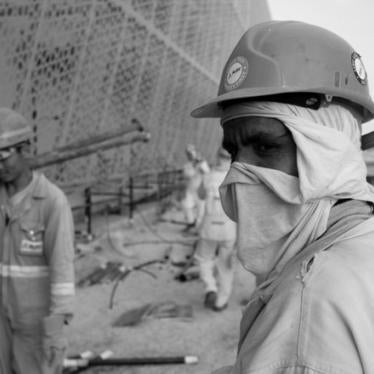(New York) - A commitment by the Guggenheim to protect the rights of laborers building its new museum in the United Arab Emirates is a positive step, but falls short in addressing key areas, Human Rights Watch said today.
The provisions announced on September 22, 2010, notably lack a requirement for contractors to reimburse workers for huge recruitment fees that effectively force laborers to remain on the job until the fees are repaid. The announcement also lacked provisions for independent, third-party monitoring as well as any provisions that address worker rights to collective bargaining and a fair minimum wage.
"The Guggenheim's public announcement is an important affirmation of the private sector's role in protecting worker rights," said Sarah Leah Whitson, Middle East director at Human Rights Watch. "But the agreement is incomplete, and lacks the monitoring and penalties that will turn promises into real protection."
A statement issued by the Guggenheim and its government-owned partner, the Tourism Development & Investment Company (TDIC), said that all companies involved in building and operating the museum's Abu Dhabi branch will be required to provide workers with electronic wage payment, overtime provisions, annual leave, a weekly day off, and health insurance.
Companies would also have to provide the workers with contracts in local languages before they enter the UAE, access to a complaints body at TDIC, and transport to public buses to take them off Saadiyat Island, where the museum is being built.
In a 2009 report, Human Rights Watch documented a cycle of abuse on Saadiyat Island that leaves migrant workers deeply indebted and unable to protect their rights or even leave their jobs. Each of the 94 workers interviewed for the report said he paid between US$1,800 and $4,100 in recruitment fees prior to his employment, highlighting the nearly universal acceptance of this practice in the UAE. The average annual salary, including overtime wages, for construction workers on the island is about $2,575.
Unlike New York University (NYU), which announced similar contractual safeguards earlier this year, the Guggenheim did not include explicit provisions to require companies to reimburse workers for any recruitment or other employment-related fees that they are found to have paid, although the Guggenheim clearly reaffirmed an employer's responsibility for such fees. Indebtedness for recruitment fees remains the primary factor in creating conditions of forced labor, with workers required to use their wages to pay off the fees, and pressured into remaining in their jobs regardless of abusive conditions.
Human Rights Watch is also concerned about the absence of clear provisions for independent, third-party monitoring of compliance by employers or for enforcement. It is unclear what legal recourse the Guggenheim has in the event of a breach by a contractor employing workers on its project, with which it will have no direct contractual relationship, or if the TDIC does not abide by its commitments. Nor is it clear what penalties, if any, will be imposed on contractors that violate the terms. Other shortcomings include the absence of protections for workers to bargain collectively, appoint worker representatives, and to strike, and the lack of any guaranteed minimum wage.
"Whatever the good intentions of the parties, there needs to be a mechanism that will independently monitor labor conditions on the ground, and there need to be clear enforcement provisions that will make sure the promises are kept," Whitson said.
Background
Abu Dhabi, the capital of the UAE, seeks to convert Saadiyat Island into an international tourist destination, at a cost of $27 billion. The low-lying island will have four museums and a performing arts center designed by world-renowned architectural firms as well as the NYU campus, golf courses, hotels, and luxury residences. Other international institutions planning to open branches on the island include the French Museum Agency (responsible for the Louvre Abu Dhabi).
The May 2009 Human Rights Watch report, "‘The Island of Happiness': Exploitation of Migrant Workers on Saadiyat Island, Abu Dhabi," documented the severe exploitation and abuse of South Asian migrant workers constructing the infrastructure for the cultural centers on Saadiyat Island (the "island of happiness"). In its report, Human Rights Watch called on the Guggenheim and other international institutions to insist on concrete contractual commitments from all companies involved in constructing the campus.
The Human Rights Watch report was based on interviews with migrant workers and meetings with UAE and French government officials, as well as officers of international institutions and corporations with projects on the island. The report found that the UAE government and the authorities responsible for developing Saadiyat Island have failed to tackle the root causes of worker abuse: unlawful recruitment fees, broken promises of wages, and a sponsorship system that gives an employer virtually complete power over his workers.






